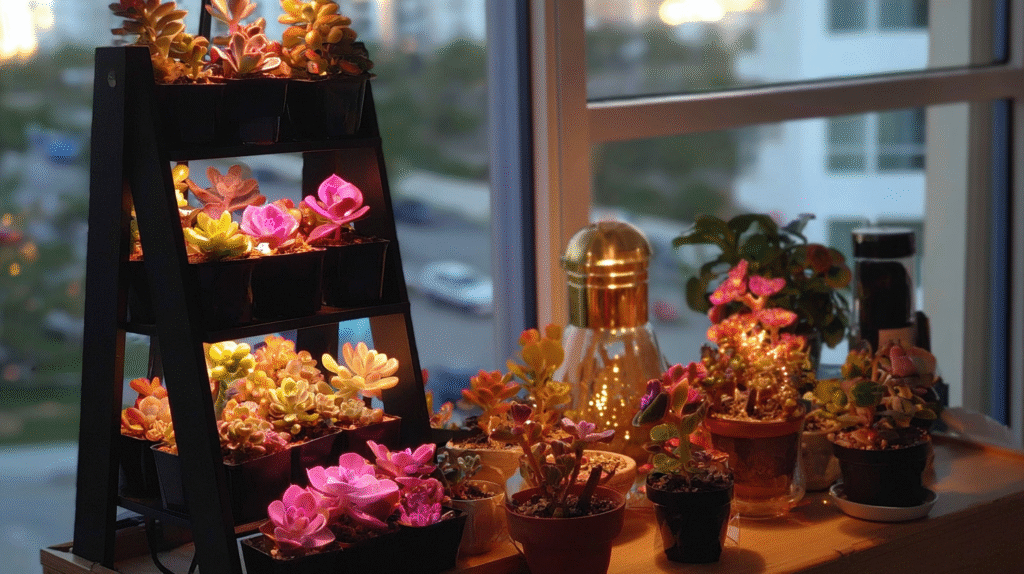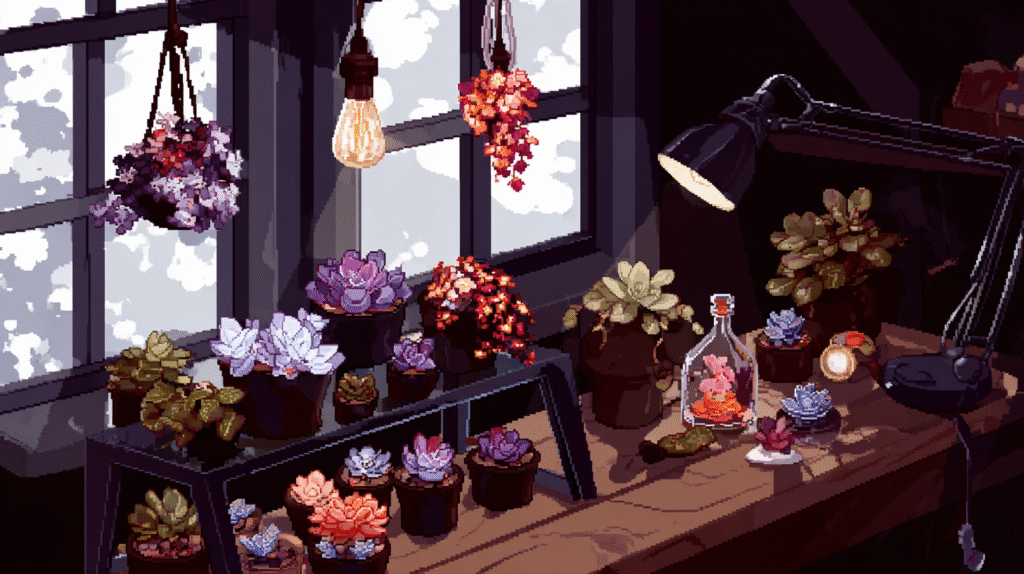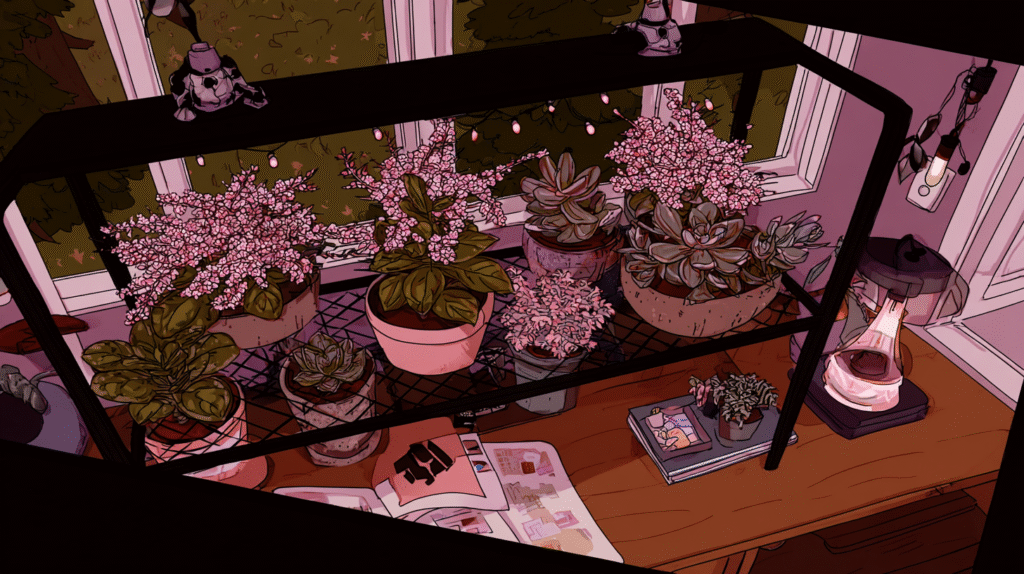For two years, I was a succulent serial killer. My victims included three echeverias (stretched beyond recognition), five jade plants (dropped every leaf), and countless others that turned to mush despite my best efforts. My north-facing apartment was basically a succulent hospice.
Then my friend visited, took one look at my latest casualty — a $30 string of pearls that looked more like string of raisins — and said, “Why don’t you just get a grow light?”
A grow light. So obvious, yet it had never occurred to me that the solution to my succulent murders could be a $25 bulb from Amazon. Six months later, I’m surrounded by compact, colorful succulents that actually look like the ones on Instagram. Here’s how one simple light changed everything.
The Dark Reality of My Pre-Light Days
My apartment is what real estate agents call “cozy” and what I call “cave-like.” The brightest spot gets maybe three hours of indirect light on sunny days. My succulents’ response to this environment was consistent:
- Echeverias stretched until they looked like palm trees
- Jade plants went from thick, glossy leaves to thin, wrinkled sadness
- Everything turned pale green regardless of original color
- New growth came in smaller and more spaced out
- Eventually, they’d give up entirely
I tried everything except addressing the actual problem. Moved them closer to windows (still not enough). Watered less (they died slower but still died). Different soil (helped with rot, not with light). I was rearranging deck chairs on the Titanic.
The Light Bulb Moment (Literally)
After my friend’s suggestion, I spent hours researching grow lights, getting overwhelmed by PAR values, lumens, and spectrum talk. Finally, I just bought a basic full-spectrum LED bulb for $25 and stuck it in my desk lamp.
Within two weeks, I noticed:
- My stretched echeveria started growing compact new growth
- The jade plant perked up and stopped dropping leaves
- Colors began returning to my ghostly pale plants
- New growth came in thick and tight
It was like watching time-lapse photography, except it was happening in my actual apartment.
My Dead-Simple Setup That Actually Works
Here’s exactly what I use (no affiliate links, just what works):
The Light:
- Sansi 24W Full Spectrum LED Grow Bulb
- Cost: $25
- Fits in any standard lamp
The Setup:
- Regular desk lamp from Target (had it already)
- Positioned 12 inches above plants
- Timer outlet from Amazon ($10)
- On 12 hours, off 12 hours
That’s it. No fancy growing station, no complicated mounting system. Just a bulb, a lamp, and a timer. Total investment: $35 if you already have a lamp.

The Transformation Timeline
Week 1: No visible change, started doubting everything
Week 2: New growth on echeveria noticeably compact
Week 4: Jade plant growing new leaf pairs
Week 6: Colors starting to show (pink edges on echeveria!)
Month 3: Everything growing like actual succulents, not sad stretchy impostors
Month 6: People asking for propagations because my plants look so good
The change wasn’t instant, but it was dramatic. My “Perle von Nurnberg” went from pale green to purple-pink. My jade developed that red tinge on the edges. Everything stopped stretching and started growing properly.
What Nobody Told Me About Grow Lights
Distance matters more than I thought:
- Too close (6 inches) = sunburned tips
- Too far (24+ inches) = still stretching
- Sweet spot: 10-14 inches for most succulents
Consistency is everything:
The timer was crucial. Plants need a regular light cycle. My random “turn it on when I remember” approach failed miserably.
Heat can be an issue:
Even LED bulbs produce some heat. I learned to check the temperature at plant level after crisping a baby echeveria.
One bulb doesn’t cover much:
My 24W bulb effectively covers about 1 square foot. I ended up getting three more for different areas.
Mistakes I Made So You Don’t Have To
The Always-On Disaster:
Left lights on 24/7 thinking more = better. Plants got stressed, stopped growing. They need darkness too.
The Color Temperature Confusion:
Bought a “warm white” bulb first. Plants grew but stayed stretched. Full spectrum or 6500K works way better.
The Distance Dance:
Kept moving lights trying to find perfection. Plants got confused. Pick a distance and stick with it for at least a month.
The Water Adjustment Failure:
Didn’t realize plants under grow lights need more water. Lost a few to unexpected dryness before adjusting.
My Current Setup Evolution
What started as one bulb has evolved (okay, exploded) into:
Succulent Shelf:
- 4-tier wire shelf from Home Depot
- LED strip lights under each shelf
- Houses 30+ small succulents
- Total cost: about $100
Propagation Station:
- Small grow bulb over a propagation tray
- 90% success rate now (vs. 30% before)
The Desktop Garden:
- Original bulb still going strong
- My work-from-home view
- 5 different echeveria varieties thriving
Unexpected Benefits Beyond Survival
Stress colors appeared:
My succulents developed colors I didn’t know they could have. That plain green echeveria? Turns out it’s supposed to have pink edges.
Flowering happened:
My jade plant bloomed for the first time in three years. Under the grow light, several succulents have flowered.
Propagation success skyrocketed:
Leaves that would rot or shrivel now reliably produce babies. I’m giving plants away because I have too many.
Winter blues improved:
Honestly, having a bright light on 12 hours a day made my cave apartment feel less depressing. Win-win.

The Numbers That Convinced My Skeptical Partner
- Succulents killed pre-light: 20+ over 2 years
- Cost of dead plants: roughly $300
- Succulents killed post-light: 1 (overwatering, not light-related)
- Current collection: 40+ thriving plants
- Investment in lights: $150 total
- Therapy savings from not crying over dead plants: Priceless
Real Talk About Limitations
Grow lights aren’t magic. They won’t:
- Fix overwatering problems
- Make up for terrible soil
- Save plants that are already too far gone
- Replace the need for proper care
They will:
- Provide consistent light in dark spaces
- Keep succulents compact and colorful
- Enable year-round growth
- Make indoor succulent growing actually possible
Advice for Grow Light Beginners
Start small:
One bulb, a few plants. See how it goes before investing in elaborate setups.
Use a timer:
Consistency matters more than perfection. Set it and forget it.
Adjust gradually:
Start lights farther away and move closer slowly. Sunburn happens fast.
Expect adjustment period:
Plants might look weird for a few weeks while adapting. Be patient.
Don’t overthink it:
I wasted months researching. A basic full-spectrum bulb works fine for most succulents.
The Bottom Line
That $25 grow light bulb saved my succulent-growing dreams. My apartment hasn’t gotten any brighter, but my plants don’t care because they have their own personal sun. The friend who suggested it now jokes that she created a monster — my apartment looks like a succulent nursery.
But here’s the thing: it’s so simple. No complicated setups, no expensive equipment, just a bulb that tricks plants into thinking they live somewhere sunny. If my cave-dwelling, black-thumb self can grow Instagram-worthy succulents with a desk lamp and a timer, anyone can.
My only regret? Not trying this two years and $300 worth of dead plants ago. If your succulents look sad despite your best efforts, if your windows face north, or if winter turns your plants into stretched nightmares, just get a grow light. Start with one bulb. Your succulents will thank you, your confidence will soar, and you’ll wonder why nobody told you it was this easy.
Trust me — I’ve got 40 thriving succulents that prove it works. 💡🌵







